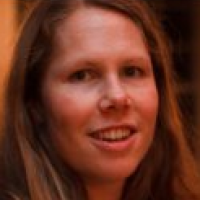TCC11 Keynote: More Pics & Vanya's Take
Here's another look at this morning's keynote, this time with pics and perspective from Vanya Tucherov, Tableau QA Engineer:
It is 8:15 on a mild yet sunny Tuesday morning, and Tableau Software CEO Christian Chabot won't arrive on the dais for at least a half an hour, but there is already a steady influx of Tableau Customer Conference. It's somewhere more than a trickle, but not quite a stream, but prime seats are already filling.

By 8:20, the ambient buzz in the crowd started competing with the pre-event music.It's clear that they're expecting something transformative from the morning's talk. It'd fit the nature of Tableau, already tagged by the influential Gartner Group as positioned as a challenger in the competitive Business Intelligence niche based on the company's "ability to execute" and "completeness of vision."

At half past, the audience is competing on equal footing with the blaring mix of 70s through contemporary rock. As the Ohio Players' "Rollercoaster of Love" gives way to Soft Cell, and then fades away, the crowd quiets in anticipation. It's now near standing-room only, with scattered single seats at the front on the extreme wings. Those will fill shortly. By the time Christian is introduced by Tableau Exceutive Vice President of Marketing Elissa Fink, the standing cohort rings the rear and flanks of the room. The energy which was in the crowd gets refocused and redirected as Christian begins to speak.
The talk starts in an unusual way- at a conference largely populated by Tableau enterprise customers, Chabot starts talking about Tableau Public, and then ties it deftly back to the thread of enterprise business intelligence- or, more accurately, being dynamic, transformative and perhaps even a little disruptive in unlocking the stories contained in volumes of data in the workplace. "It's not until you give everyone a fast and easy application to use with their data that you'll find out what they really know. People will use data in unexpected and unusual ways to transform their workplaces, and will reach a higher level of achievement as a result."
"What we've learned with Tableau Public is that this free offering is more advanced than 99% of the business intelligence software used by companies around the world." Christian is just finishing his warmup and hitting his stride now, and pivots seamlessly to presenting a case study- the positive impact that Tableau has had at Seattle's Children's Hospital. Tracking tests to eliminate duplicated or unnecessary procedures cut costs, but more importantly reduced infection risks, patient discomfort, and the amounts of medical waste produced. Analyzing data around diagnosis and treatment order sets drastically shortened healing times and allowed standardized treatment of patients with similar diagnoses. And with Tableau, the power to analyze this data and answer the questions they have about it no longer needed to reside in the hands of SQL reporting and traditional BI teams, but could be placed in the hands of the people who were positioned best to both understand the need and benefit from the findings- the medical staff. Tableau also empowered the financial assistance teams at Children's to reduce the worries of the families of sick children by cutting the time it took to determine eligibility for cost offsets from a matter of up to two weeks to a few days or less.
"When companies give people self service analytics tools they can use to answer questions, they feel powerful. They feel informed. They feel empowered. When you have to wait on others for answers to questions you need answered, it's defeating. It's soul-sucking. It's demoralizing." Chabot continues, "Studies show that the most important asset which makes us productive at work is a sense of achievement- that we're making progress toward a goal. BI has the potential to do more than make more efficient supply chains. It can build good companies."
"We're going to be transformative by looking at what works, in spite of the fact that it's not the conventional approach and is considered disruptive. And it's working- it's why Gartner has reported that Tableau is the fastest growing business intelligence company in the world."
Continuing on fast growth and transformation, Chabot shifts gears again and starts talking about Tableau 7. The crowd is intent on his every word and gesture, and paying rapt attention, and they're not being disappointed. He touches on some of the feature set which was included in Tableau 6.1- and notes that although technically a 'dot' release it was packed with new feature sets of significant scope; and then unveils the Tableau 7 set before proceeding to show off some of his favorite bits of Tableau 7, starting with the new Data Server.

Subscribe to our blog
在您的收件箱中获取最新的 Tableau 更新。



